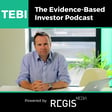Become a Creator today!Start creating today - Share your story with the world!
Start for free
00:00:00
00:00:01

Ep 37: Craig Lazzara on the volatile start to 2022
We live in interesting times. War in Ukraine, energy worries, inflation and a possible global recession. It's no surprise, then, that stock markets around the world have fallen considerably, and there seems to be no end in sight to the current volatility. We wouldn’t be human if "headline anxiety" didn’t have an impact on us. Robin Powell's guest on this episode is Craig Lazzara from S&P Dow Jones Indices. Craig puts recent market volatility into historical perspective.
Transcript
Introduction to TEBI Podcast
00:00:08
Speaker
Hello and welcome to the TEBI podcast. I'm Robin Powell. This podcast is brought to you by Regis Media, which provides high quality video content to financial advice and planning firms. Whether it's marketing or educational content you're looking for, get in touch with us by the website at regismedia.com.
Global Challenges Impacting Markets
00:00:34
Speaker
So we live in interesting times, don't we? War in Ukraine, energy worries, inflation and a possible global recession. There's certainly plenty of bad news around. And of course, stock markets around the world have fallen considerably and there seems to be no end in sight to the current volatility. We wouldn't be human if headline anxiety didn't have an impact on us.
Market Anxiety with Craig Lazara
00:01:02
Speaker
Our guest today is Craig Lazara from S&P Dow Jones Indices. Craig is a managing director based at S&P's headquarters in New York City. Now I'm not saying that Craig can alleviate any anxiety you might be feeling, but he can at least put all of this into some sort of perspective. Enjoy my interview with Craig Lazara.
00:01:30
Speaker
So Craig, thank you very much for joining me. I suppose the question everybody's asking, and I don't expect you at all for one moment to provide an answer to it is, are we in a bear market? Are we at the start of a long market downturn?
00:01:49
Speaker
Well, I'm glad you don't expect me to answer it. I'll do my best. There is no official definition of a bear market. I mean, typically we say a bear market is a 20% decline and a correction is a 10% decline. And by that definition, we're clearly in
00:02:10
Speaker
correction territory for most major indices, certainly those here in the US. But short of Russia, there's nobody that I'm aware of that's in an actual bear market. Now, the question, the better part of the question, I think, Robin, to give it the seriousness that it deserves is where do we go from
Market Unpredictability and Opportunities
00:02:32
Speaker
here? And I think what I would say in response to that is,
00:02:37
Speaker
It's impossible to know. I mean, it's not at all difficult to make up a list of, or to come up with a list, one doesn't have to make it up, unfortunately, of really unpleasant things that could happen over the course of the next several months. There could be a widening of the war in the Ukraine. There could be
00:02:57
Speaker
other commodity shocks, who knows what China might do from a geopolitical standpoint, ongoing high inflation and central bank policy. There's lots of things that one could cite as potential sources of harm. But in thinking about this question, I think back to as recently as two years ago, if we were recording two years ago this time, we would have said we're in the midst of a global pandemic,
00:03:28
Speaker
There's obviously a very serious disease out there. We don't know much at that point about where it came from, how virulent it might be, how far it might spread, what the ultimate fatality rate would be in response to that uncertainty.
00:03:46
Speaker
As far as I'm aware, every major economy in the world voluntarily shut itself down. Not surprisingly, the markets fell very quickly. There was a huge response, obviously, the suppression of economic activity. So I recall the S&P 500 fell something like 37% in the space of not much more than a month between mid-February and mid-March, end of March 2020.
00:04:13
Speaker
And for calendar year 2020, the S&P 500 was up 18%. So it's hard to know. And when you're in the midst of it, as we are now, it's particularly hard to know because it feels very frightening because there's a lot of uncertainty. And
00:04:36
Speaker
very often, historically, buying at times of great uncertainty over the long run are times of great opportunity. Certainly, that would have been the case two years ago. Exactly. As you say, we are right in the eye of the storm at the moment.
Volatility and the VIX Index
00:04:54
Speaker
A pattern we're seeing, and of course, not unusual at all for
00:05:01
Speaker
periods of market volatility. We're typically seeing markets up 3% one day, down 3% the next, up 3% the next. And it's a real roller coaster like that. There was an interview with Gene Farmer in the New York Times the other day, in which he explained how there'd been this massive injection of uncertainty in the global markets and investors are
00:05:28
Speaker
struggling to quantify the risk, if you like, that that poses to the global economy and the financial markets. Do you think that's fair? Yes. You can almost measure it in some ways. We look at the VIX index or other measures of volatility. The VIX, at the moment, has got a 32 handle. Typically, when VIX is above 30,
00:05:57
Speaker
I mean, what that basically is telling is you should expect two or 3% moves every day. That's the level of volatility that we have. And of course, the problem with volatility, as Fama suggests, is you don't know how it's going to come out. I think one of the, certainly the lessons of history is that for investors who
00:06:27
Speaker
have the luxury of doing nothing. There's no necessary reason to panic. I'll cite Jason Swag wrote in the Wall Street Journal a couple weeks ago.
00:06:47
Speaker
was talking about the way investors feel about, and I say feel, it is an emotional experience, the way investors feel about what's going on in the market. And he said, I'm not going to quote him exactly, it may seem like a disadvantage that individual investors
00:07:06
Speaker
don't have forecasts and don't have opinions and don't have to react to what's going on. So that's not a disadvantage. That's a big advantage. History is very clear that even if you are making your very first investments, not from a long established portfolio, but if you're making a first investment at a period when volatility is elevated as it is now,
00:07:35
Speaker
That is not a bad entry point. You may have to be patient. It may take a year, two years, three years before you begin to see profits. But entering at a time of high volatility is not a bad thing, provided you have the wherewithal to ignore the volatility.
SPIVA Scorecard and Active Management
00:07:56
Speaker
So Craig, for many years you've run SPIVA, which as most of our listeners will know is the S&P Index versus Active Scorecard. It's basically a scorecard of active fund managers around the world compared to the appropriate S&P Index.
00:08:19
Speaker
I assume Craig, it's too early for you to say whether you've got any clues at all as to how active managers have actually fared during this. Well, I suppose the volatility in a sense started in January, didn't it? Yeah, yeah, certainly.
00:08:38
Speaker
accelerated with the invasion. You're right. I mean, we are just now beginning. I mean, literally when I say just now, literally yesterday as we record this, SPIVA for Latin America came out. That's for calendar 2021 though. So I mean, we're looking at historical results.
00:08:57
Speaker
And I haven't looked through the results. They're about what you would expect. They're consistent with history. And the history of this, obviously, Robin, you know this, is that the majority of active managers underperform most of the time. Now, the thing, and so to say what's going on now in 2022, how will that play out? I think there are both positives and negatives.
00:09:27
Speaker
The biggest positive for active managers is that there's a slightly, I should say it this way, active management tends to do slightly less bad. I won't say do slightly better, but slightly less badly in periods when the market declines because active managers have the ability to raise cash.
00:09:54
Speaker
Uh, and obviously if they do that in a timely way and the market goes down, that's a source of value added. So that, that is now whether, whether as a group, they don't actually do it that well, but, but that is certainly a potential source of value added. Uh, so that's, that's, you know, as, as we say, if we, if we look for what's what the first part of 2022 is it'll look like that's something that might be on the side of, of at least some active managers, uh, contrary to that.
00:10:21
Speaker
One of the things that's very clear in the SPIVA data is that most active managers are underweight lower volatility, low beta names, and overweight higher volatility names. You see that because, for example, when I low volatility index underperforms,
00:10:48
Speaker
which is to say when the least volatile stocks are not doing well, when low volatility underperforms, that tends to be a relatively more favorable time for active management. When low volatility outperforms, that tends to be a much more difficult time for active managers. As you will not be surprised to learn, one of the best performing factor indices for the last month has been low volatility.
00:11:17
Speaker
And so I would speculate that this will not be a particularly favorable time for active managers.
Tech Sector Downturn and Active Managers
00:11:28
Speaker
The other thing to say, I think, is one of the worst performing sectors over the last month or so has been technology, which has been the source of much outperformance for the past several years. So to the degree that managers were tilted in that direction,
00:11:41
Speaker
Again, it will be a more difficult time going forward. And on that subject, I got regular updates from our friend, Larry Suedro, almost daily as to how Kathy Wood at Arc is doing. The last missive I had from Larry was down, I think, 65% from
00:12:09
Speaker
the height 13 months ago, which means that she has to produce returns at 265% just to recover the ground that she's lost.
00:12:25
Speaker
in that time. And yeah, you do hear about a lot of technology managers who've got very unstuck. But I suppose in their defense, they run technology funds, you know, and they're going to pick technology stocks and technology is going to come in and out of fashion.
00:12:46
Speaker
Yeah, no, that's, that's, that's certainly true. And, you know, I, I've met Kathy when I don't know the fund, the fund, well, I mean, I know what she does, obviously, but don't know the fund intimately well. But no, clearly, if, if, if you listen to what Kathy would says, and you buy the fund, you know, you're getting a tech fund, you know, you're getting these disruptive, what she characterizes as disruptive technologies. And, and
00:13:12
Speaker
And you should expect that to be a volatile ride. But when I say that technology has been particularly weak this year, I'm really referring more not to specialist technology funds, but to more general actively managed equity portfolios, where a source of value added for a good many years has been
00:13:36
Speaker
overweights in technology, and that's gone away. So unless a general active manager were very nimble at reducing his tech exposure, this year, whatever helped him last year is hurting.
00:13:52
Speaker
So how have the different segments of the market, if you like, responded so far to two events in Ukraine? Clearly Russian funds are in all sorts of trouble, many of them gated and so on, and investors can't get their money out. You mentioned tech and the tech bubble bursting, but in a sense that kind of predated Ukraine, didn't it?
00:14:19
Speaker
A little bit, yes. So how have the different sections of the market, if you like, responded to this crop? There have been some very wide swings, as we would call very wide dispersion, whether you look at the factor level or at the sectoral level. So again, not shockingly, given what's happened. The S&P 500 in
00:14:48
Speaker
the month of March to date, I think it's down 4.6%. Energy is up 9.7%. And by far the best performer, and not surprisingly live, oil prices are shooting upward every day. The weaker fact sectors have been
00:15:14
Speaker
at technologies, we've talked about financials and also consumer discretionary. And that, again, kind of makes sense if there's going to be a general decline in economic activity. Consumers will cut back on their discretionary purchases.
00:15:30
Speaker
But that spread within the space of really only a little more than a week in the month of March as we record this is just enormous. If you look at factors as opposed to sectors, you get kind of a similar look. I mentioned low volatility earlier. The market's down 4%.
00:15:50
Speaker
4.5% low vol for the month of March, at least through yesterday, was down about 0.6%. So good defensive sector dividend, sensitive stocks are doing pretty well. Value is doing pretty well. And growth, which as you know is technology dominated, growth, momentum, high beta are all lagging quite substantially. So there's a very wide dispersion of
00:16:25
Speaker
The very first paper we ever published to talk about market dispersion was called dispersion semicolon measuring market opportunity. Dispersion is a measure of opportunity. And so when dispersion widens, other things equal, it means that active managers have the opportunity to create more value than they do when dispersion is narrow. The question is the opportunity there because the opportunity clearly is
00:16:47
Speaker
And coming back to a question you asked earlier, Robin.
00:16:53
Speaker
The question is, are they able to take advantage of it? And that history
Historical Market Responses to Wars
00:16:57
Speaker
says that by and large, they are not. So, talking about history, we've got a major historical event on our hands, the invasion of Ukraine.
00:17:10
Speaker
is the biggest conventional attack in Europe since the Second World War. I think the last European war we had, I remember reporting on in Yugoslavia in the early 90s, I mean let's hope that it doesn't
00:17:29
Speaker
get as bloody and internecine as that, but how have markets historically fared during wars? Presumably not very well. Well, again, it depends on the time horizon.
00:17:54
Speaker
No analogy is perfect. But I think back to Saddam Hussein's invasion of Kuwait in 1990, the market declined for a while. And again, we had a spike in the oil price for the obvious reason. Markets declined for a while, but ultimately finished upward. So the
00:18:16
Speaker
Except for the country's directly involved in obviously russia which is under embargo from the rest of the world or sanction the rest of the world is the stock market is suffering very badly and unsurprisingly. But the four for the countries which are not combatant but which obviously are affected by by conflicts it's it's not it's not clear that that.
00:18:47
Speaker
that a war is always a signal to retreat. I mean, it comes back to the issue we're speaking about a moment ago in terms of volatility. There's a lot of uncertainty. And that said, uncertainty is
00:19:05
Speaker
is not a signal to change your investment portfolio. Historically, those who have invested during periods of high volatility or high uncertainty have done well. It may feel frightening and it may take longer than it would in other times, but the uncertainty in itself is not necessarily a sign of an oncoming bear market.
00:19:33
Speaker
I see that Dimson and Marsh and Staunton have just brought out their latest version of the global investment returns yearbook from Credit Suisse. And their research clearly shows, as you say, that as long as you weren't Germany or Austria, I think I remember reading in that report that Austria
00:19:58
Speaker
was the worst before market. Apart from Russia, of course, in the 20th century, as long as you weren't particularly one of the losers, if you like, that you didn't necessarily in the long term suffer. And as we all know, markets rebounded
00:20:22
Speaker
and eventually in Japan, massively rebounded before falling again. So generally what you're saying, Craig, is investors, the fact that it's a war, and obviously as long as it doesn't turn nuclear, obviously, is not necessarily a nightmare outcome for their portfolios.
00:20:50
Speaker
No, I mean, I hate to say it, Robin, because it makes me sound very callous, because I can be very callous, of course, I know that. But it makes me sound callous. Just abstracting from the moral issue, abstracting from this really inspirational bravery of the Ukrainians faced with this much, much larger foe.
00:21:20
Speaker
abstracting from all that, unless the war gets much worse. If there's a wider land war in Europe, obviously that has implications beyond what we're seeing in Ukraine. I don't mean to minimize the degree of disruption, particularly if Russian oil is sanctioned.
00:21:43
Speaker
Of course, President Biden announced yesterday, as we record this, that the US would ban imports of Russian energy. Much harder for Europe to do that, of course, but particularly to the degree that Russia is isolated from the world economy.
00:22:02
Speaker
That will be disruptive. It will be a source of volatility. It will be a source of perhaps of economic recession in parts of Europe. And I don't mean to gain say that, but I come back to what we said earlier. Look at history. And over time, markets tend to rise. The capitalist system tends to do well.
00:22:29
Speaker
highly volatile parts, highly volatile times are not a bad entry point. I mean, I think of something Warren Buffett has attributed to Buffett, and I'm not sure it's an exact quotation, but you should
00:22:44
Speaker
buy when others are fearful and sell when others are greedy. And here's a time when many people are fearful. Exactly. It's been fascinating talking to you about the Ukraine situation and the impact on the markets. I just want to ask you about a couple of other things before you go. I know you've written recently about the value premium.
00:23:09
Speaker
And yeah, it's been quite sort of stop start, hasn't it? But basically the value premium has re-emerged then sort of gone away again and then come back again. Maybe you could just explain what's happened. Sure. If you look at...
00:23:30
Speaker
The exact analysis depends on how you define value and how you define growth. But if you take the way that we typically do it at S&P and split the S&P 500 into a value half and a growth half, what you see is there are
00:23:46
Speaker
long periods of time when growth outperforms, there are long periods of time when value outperforms. We're currently, as you say, in a period, started last, I want to say December, when value has been doing much better than growth. And if you look at the history of value and growth, at least again, as we measure it, the shortest period of
00:24:16
Speaker
value dominance has been six months. The longest was four and a half years. So the fact that we're now maybe four or five months into a period of value outperformance does not tell you, well, if the longest historical period were six months and we're now at four, I'd say, get ready to do something. Guys, it's almost over.
00:24:39
Speaker
But it's not. There have been periods, I think from mid-2003, I think until 2007, long run when value did much, much better than growth. The other thing that analysis shows if you do that is people have asked, well, it may be true that value does better than growth for a multi-year period.
00:25:05
Speaker
But it might also be the case that the majority of values advantage occurs very early on. And after that, it just trickles in. And it turns out to be the case that, in fact, the value premium accrues fairly steadily. So it's not like in the 50-month period that we saw in 2015.
00:25:29
Speaker
2007, it is not the case that most of the benefit occurred very early on. It occurred steadily over time. And so that's not in itself a forecast that values out performance will continue. But certainly there's nothing in the history that would say, because we've done well for the past, or values done well for the past four or five months, that it's time to begin worrying that its run is almost over.
00:25:59
Speaker
And the final question I want to ask you is about alternative investments. We're seeing this massive push, aren't we, at the moment, particularly in the institutional space, but also to a lesser extent in the retail space as well, this push towards hedge funds, private equity, venture capital and so on.
00:26:20
Speaker
Now, I know you guys at SPIVA have been very much focused on the public securities markets, if you like, but what can you tell us about evidence as to whether
The Value of Alternative Investments
00:26:38
Speaker
or not these kind of investments have delivered decent returns in the past? I'm thinking, for example,
00:26:47
Speaker
of a study by Morningstar, which John Reekenthaler recently wrote about, which he actually showed that these alternative investments have been, I think the word he used was pretty useless at kind of hedging against Market Falls, certainly since 2007, and also haven't provided the diversification benefits that many people think they do.
00:27:17
Speaker
What's your own take on that? What you just said, Robert, is very close to what I've garnered from my reading about the subject. I mean, you're right that what we do in SPIVA relies on public markets because we need to have prices.
00:27:42
Speaker
I would say drawbacks of alternative investments, so they tend to be relatively obscure. Now, in some cases, that's necessary. If you're a venture capital fund and valuing a private company and there's no public market for the shares, there's a certain amount of flexibility in how the valuations are done. And we certainly can't observe that from a
00:28:05
Speaker
a universe standpoint. I guess I would say, I think there are two things that one might say, and I think the research on this is fairly conclusive. One is that the Morningstar study that you cited is correct, that as a group, alternative investments have done
00:28:32
Speaker
certainly after costs have done no better for investors than they could have done simply by investing in a well-diversified index of public securities. I think the second thing that's true is that
00:28:49
Speaker
There may be, at least in some alternative categories, kind of a hierarchy of managers. And you can identify some who have done extremely well over time and really have provided value added to their clients. And what's typically true of those investors is that they won't take your money.
00:29:11
Speaker
They've already, they've already got as much to invest as they as they need. This is one of the advantages that you listeners will have heard perhaps of the so called Yale model pioneered by the late David Swenson.
00:29:26
Speaker
Clearly the case that the Yale Endowment, Yale University Endowment did extremely well over many years, thanks no small part to Swenson's abilities. And one of the things he did was very early on, began to get to know venture capital firms, tried to figure out who the good ones were, and
00:29:48
Speaker
because he realized there was a huge gap in performance. The asset class as a whole may not do much for you. The very best managers may be able to do a great deal for you. The problem is you need to devote
00:30:08
Speaker
someone with Swenson's abilities to figuring out who the best managers are and then forging relationships with them so that they can accept your money as they would do with Yale. But from the standpoint of an individual investor,
00:30:27
Speaker
the likelihood of being able to do that analysis and finding a manager who wants additional assets to me is not worth the trouble. You're much better off just investing in, as I say, a broadly based index of public market securities, which over time has done as well as the alternative asset classes.
00:30:53
Speaker
Indeed, we saw the SEC, didn't we, a few weeks ago, signal its intention to step up transparency, if you like, in the alternative investments space, particularly private equity. It's unlikely, of course, that we're ever going to get the kind of data that enables you to produce a table like
00:31:21
Speaker
for example, but presumably Craig, one day you and your colleagues will be able to sort of, we hope, study the performance of private equity funds and venture capital funds in a more meaningful way than you can at the moment. Yeah, we would love to be able to do it because obviously people ask for this, clients ask for this all the time and we'd love to be able to do it. The problem is simply the
00:31:51
Speaker
obscurity of the data. The other part of the problem, I would say, is even when you have databases of alternative asset returns, they're typically self-reported, which means that if I'm a private equity manager and I have a particular fund that hasn't done very well, maybe I don't report it.
00:32:13
Speaker
And yet with the benefit of SPIVA, and the reason it I think has the reputation that it has, it's done on a database of mutual funds, which are required to report. And so you can adjust for survivorship effects and survivorship bias, which is
00:32:35
Speaker
Very important. Any kind of investment analysis you do, obviously, if you're looking at historical returns, you want to make sure they're adjusted for survivor bias. And SPIVA is, and it's not necessarily the case that data on alternative investments has that same property.
00:32:54
Speaker
Craig, thank you so much for your time today and look forward to catching up with you again as this very interesting year that we've embarked on unfolds.
Closing Remarks with Robin Powell
00:33:09
Speaker
Thank you, Rob. It's always a pleasure to speak to you.
00:33:14
Speaker
That's about it from this episode of the Tebbe podcast brought to you by Regis Media. You've been listening to me, Robin Powell, interviewing Craig Lazara from S&P Dow Jones Indices. A big thank you to Craig for his time. I would also like to thank S&P Dow Jones Indices for its ongoing support of the evidence-based investor. Without the help of our strategic partners, we wouldn't be able to do the work we do.
00:33:44
Speaker
If you're interested in finding out how you too can partner with us, please do contact us via the TEBI website at evidenceinvestor.com. That's evidenceinvestor.com. Thanks for listening. Until next time, goodbye.















